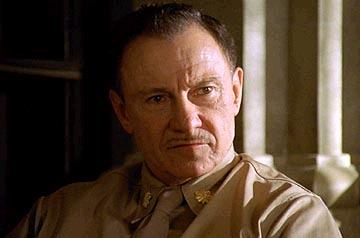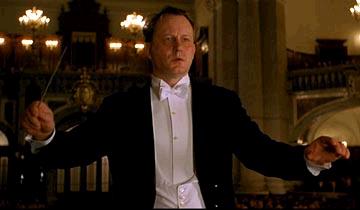

Dr. Wilhelm Furtwangler was the director of the Berlin Philharmonic Orchestra during World War II. Unlike many other German artists, he chose not to leave Germany when the war began. Moreover, he was admired by Hitler and Goebbels and the like, so when World War II was over and the Allies' Denazification Committee arrives, he is the perfect target. He is put on trial as a Nazi, and Taking Sides is the fictional examination of his guilt or innocence. It is based on the play by Ronald Harwood (Cry, the Beloved Country), who also wrote The Pianist. It cannot overcome its theatrical roots, but that is part of the power of this film. It is a contest of wills between Furtwangler (Stellan Skarsgaard, The Glass House, Dancer in the Dark) and Major Steve Arnold (Harvey Keitel, The Grey Zone, Red Dragon).
Arnold takes it upon himself to doggedly pursue Furtwangler to prove his guilt. But before actually gets to Furtwangler, he interviews many of Furtwangler's associates, trying to get a better picture of who Furtwangler actually was. Arnold is working with Lt. David Willis (Moritz Bleibtrau, Das Experiment, The Invisible Circus), an American Jew who may be Furtwangler's defense, and Emmie Straube (Birgit Minichmayr, The Farewell), the secretary. Unfortunately, Harwood and director Istvan Szabo (Sunshine, Offenbach's Secret) choose to explore these characters by having them enter a tentative romance. Then, Szabo reveals a secret about the Straube character that is more distracting than anything else.
The various interviews serve as an appetizer to the main course, which is Arnold vs. Furtwangler. The two could not be more different, and this comes through in Keitel and Skarsgaard's performances. Keitel plays Arnold like a bulldog. He sneers, yells, and does pretty much all he can to intimidate Furtwangler. Skarsgaard is the opposite. He is withdrawn, sickly, and desperately trying to prove that he is not a Nazi. The more that Keitel attacks, the worse Skarsgaard seems. Although the tone of the film seems to shift the sympathy towards Furtwangler, Szabo and Harwood make clear that making a decision in this case is not an easy one.
All the facts seem to contradict themselves. For every indictment that Arnold has, Furtwangler has an answer that makes sense, but this tends to lead to another contradiction. If he wasn't a Nazi, then why did he stay? Artistic reasons don't seem to have that much heft. . And if he was a Nazi, why did he protect some of the Jewish members of the orchestra? The element that doesn't quite work is Harwood's nearly inhuman portrait of Arnold. He hints at a life other than that of prosecutor, then throws it all out the window as Arnold doggedly pursues Furtwangler. One would presume that in a film like this, Furtwangler's arguments would have some sort of effect on Arnold, but this is not the case. The Furtwangler character then becomes more sympathetic, and people root for him to win. In the end, Szabo and Harwood are rooting for somebody. The last frames of the film are actual footage of Furtwangler, and seem to strongly imply where his true sympathies lie.